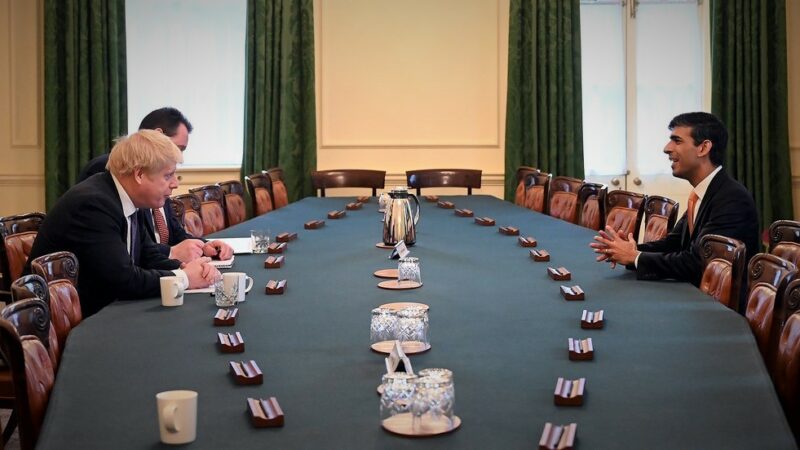The Treasury are proposing more austerity. That must not happen.

We did not have to wait long to see the Conservative government’s post-coronavirus economic strategy. It is a leaf out of the old book – more austerity, hit the poor, cut essential services.
Treasury documents leaked to The Telegraph show a government blueprint for recovering £300bn of the costs associated with the coronavirus pandemic. The measures include increases in income tax, the end of the triple lock on state pension increases and a two-year public sector pay freeze. In its 2019 election manifesto, the government promised not to increase taxes or abandon the triple lock on state pensions.
The proposed policies are wrong. The pandemic has shown that the UK needs resilient public services. Due to government policies, public services are in poor shape. The proportion of gross domestic product invested in the National Health Service (NHS) has declined since 2010.
Consequently, the NHS was in a poor shape even before the coronavirus pandemic. Around 4.5 million patients were on the hospital waiting lists, nearly twice as high as 10 years earlier. The Accident & Emergency waiting times in England were at their worst on record.
In England, in 2010, the starting annual salary of a qualified nurse was £21,200, and rose to £24,200 in January 2020. After accounting for inflation this amounts to a 5% decrease in real terms. Unsurprisingly, there were some 43,000 nursing vacancies.
By autumn this year, around 7.2 million people will be on waiting lists. Rather than investing to relieve suffering and stimulate production of goods/services, the government is planning cuts.
Other sectors also need rebuilding. Since 2010, the number of police officers declined by nearly 21,000. Around 23,500 police support staff were cut. Over 600 police stations closed. In 2010, the starting salary for a police constable in England and Wales was £23,300 compared to £24,200 in September 2019. This represents a 14% real-terms reduction in pay. During the December 2019 general election, Conservatives promised to recruit 20,000 more police officers and wage freezes won’t help.
The government plan to scrap the triple-lock on the state pension should worry millions of people. The UK state pension, main source of income for many, is around 29% of average earnings, the lowest among industrialised nations. The proportion of retirees living in severe poverty in the UK is five times what it was in 1986. So there is no economic or moral case for hitting retirees.
The government’s proposed policies make no sense. Any cuts to public services will damage the private sector too which is the main supplier.
Wage and pension cuts will severely erode people’s purchasing power and without that businesses will not be able to sell goods/services. In March 2008, the average wage was £474 per week and it only reached £474 in December 2019. The UK household debt now stands at record £1,675bn. Around 42% of the UK adults, and their dependents, survive on annual income of less than £12,500. The economy needs redistribution.
There is no shortage of resources for the government. With record low interest rates, it can borrow to invest and reflate the economy. That is how the economy was rebuilt after the Second World War and the subsequent prosperity enabled governments to reduce the public debt.
The government can use its overdraft facility known as the “ways and means” facility at the Bank of England. The Treasury has used £400m so far and during the 2008 recession it used £19.8bn. The Bank of England is using its £645bn quantitative easing programme, i.e. printing money, to support purchase of corporate bonds. The government could use the same process to bail out the poor by buying their debts.
Additional tax revenues can be raised without increasing the basic rate of income tax or national insurance contributions. HMRC estimates that due to avoidance, evasion and arrears, it fails to collect around £34bn-£35bn each year. Other studies put the amounts at between £58.6bn and £122bn a year. So during the last decade between £350bn and £1,220bn of tax has not been collected. Investment in HMRC and curbing offshore tax avoidance can raise billions.
The government gives around £40bn a year in tax relief on pension contributions and most of it goes to individuals paying income tax at the rate of 40% and 45%. By reducing the relief to 20%, the basic rate of income tax, the government can level the field and also raise £10bn for redistribution via investment in public services.
It can reverse the tax cuts given to corporations since 2010 and also restore the marginal income tax rate of 50% on individuals earning more than £150,000 a year. It can broaden the tax base through wealth tax, land value tax, by levying a financial transaction tax on billions spent by speculators each day.
After the 2007-08 banking crash, the government made the wrong policy choices and the subsequent austerity damaged large sections of society. This time, it needs to make the right choice and build a sustainable economy by investing, building resilient pubic services and boosting people’s purchasing power.
Prem Sikka is Professor of Accounting at University of Sheffield and Emeritus Professor of Accounting at University of Essex. He is a Contributing Editor to LFF and tweets here.




2 Responses to “Prof Prem Sikka: We must rebuild not tax and cut”
Prof Prem Sikka: We must rebuild not tax and cut | Left Foot Forward | Tory Britain!
[…] https://leftfootforward.org/2020/05/prof-prem-sikka-we-must-rebuild-not-tax-and-cut/ […]
Prof Prem Sikka: We must rebuild not tax and cut - Politics Highlight - News from the Left and Right
[…] 14 May 2020Politics Highlight The Treasury are proposing more austerity. That must not happen. Author: Prem Sikka | Source […]